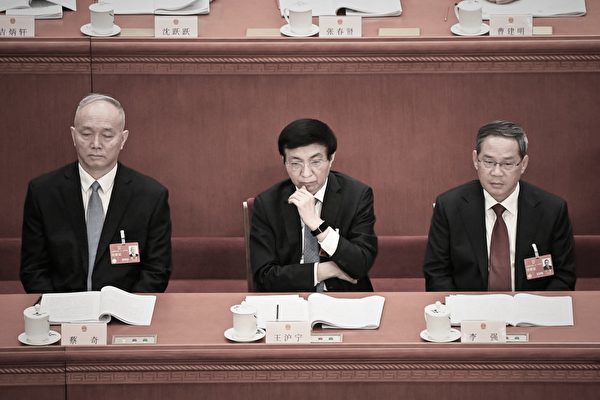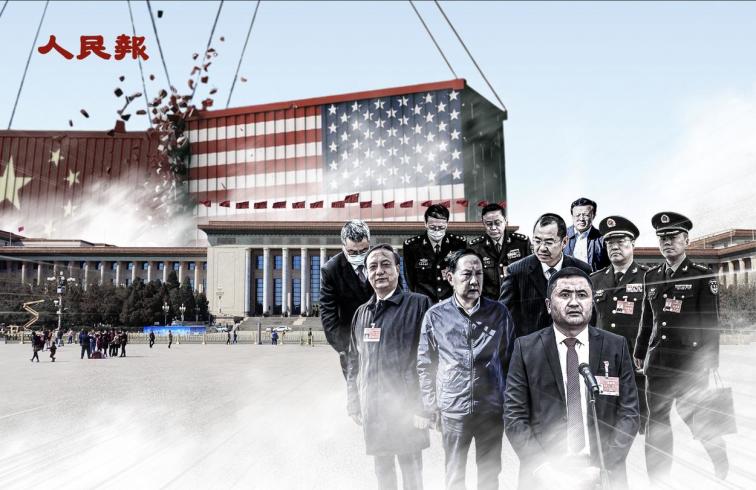Dark clouds hang over Tiananmen Square in Beijing. (Lintao Zhang/Getty Images)
[People News] On October 27, 2025, 'Epoch Focus' released a video report on the Dajiyuan website, raising the question of whether there has been any change in the power structure of the Chinese Communist Party (CCP) following the Fourth Plenary Session. This has ignited intense debate among overseas commentators, leading to three representative viewpoints:
The first viewpoint asserts that Xi Jinping continues to wield significant power and has orchestrated a purge within the military, including the nine generals who were recently dealt with, all of whom are part of Xi Jinping's own faction, being targeted for removal.
The second viewpoint suggests that Zhang Youxia and other anti-Xi factions have gained control over military power but lack authority over the party and government, ultimately achieving a precarious balance in the power struggle with Xi Jinping.
The third viewpoint posits that Xi Jinping has lost his supreme authority over the party, government, and military after the Fourth Plenary Session. It claims that the elder faction has concealed the truth to protect the party, effectively transforming Xi Jinping into a 'mascot.' In reality, the highest powers of the party, government, and military have been delegated to others.
Following this, 'Epoch Focus' provided commentary on the three viewpoints discussed.
Given that current online public opinion predominantly supports the first and second viewpoints, further elaboration is unnecessary; perspectives vary. This report highlights 'Epoch Focus's commentary on the third viewpoint.
The 'Epoch Focus' video report claims that the CCP has obscured the truth of the Fourth Plenary Session, stating that Xi Jinping has relinquished his party and military powers and stepped down, a perspective held by the commentator known as 'Ordinary People Inside the Wall.'
Reports indicate that 'ordinary people behind the wall' perceive an ongoing, unresolved relationship between Xi Jinping and Zhang Youxia, suggesting that there is no genuine opposition between the party and the military. Instead, both sides have reached a stalemate, temporarily suspending any conflict. They either refrain from fighting or determine a clear winner. The successful conclusion of the Fourth Plenary Session suggests that everything is unfolding according to plan, without any mistakes.
According to sources from within, on the morning of October 23, Wen Jiabao delivered a speech on behalf of the Party Central Committee's decision-making coordination body, relaying a message from Hu Jintao and outlining requests for Central Committee members and alternate members. Zhang Youxia articulated the military's position, asserting that the military must protect the reform and opening-up policy.
Reports further indicate that in the afternoon of the 23rd, the Central Committee collectively resolved to accept Xi Jinping's resignation as General Secretary of the Communist Party of China, with Wang Yang appointed as acting General Secretary until the 21st National Congress. They also agreed to Xi Jinping's resignation as Chairman of the Central Military Commission, with Liu Yuan stepping in as acting chairman until the 21st National Congress. The collective resignation of all Politburo members was temporarily not accepted, with a comprehensive adjustment planned for the 21st National Congress. Moving forward, documents submitted to the General Secretary of the Central Committee will be directly managed by Wang Yang, while those for the Central Military Commission will be handled by Liu Yuan. Xi Jinping will temporarily receive treatment similar to that of Hua Guofeng, following the arrangements made by Wen Jiabao.
At the conclusion of the meeting on the 23rd, Wen Jiabao underscored the principles of confidentiality and discipline within the Communist Party, leading all Central Committee members and alternate members in reciting the Party's oath. As they sang 'Unity is Strength' together, the Fourth Plenary Session came to a close.
The 'ordinary people inside the wall' believe that the Chinese Communist Party (CCP) concealing the truth about the Fourth Plenary Session is a longstanding tactic of the party. Historically, from the fall of Lin Biao, the Gang of Four, to Hua Guofeng, the documents produced by the CCP's Central Committee have consistently deceived the Chinese populace. In this instance, the CCP's reluctance to disclose the truth is aimed at preventing the public from realising that the choice of Xi Jinping as leader represents a crime committed by the CCP, leading to suffering for the Chinese people. If the public were to find out that Xi Jinping is a bad person, they might start to suspect that the entire CCP is corrupt. This is also why Deng Xiaoping refrained from overthrowing Mao Zedong; doing so would have been tantamount to dismantling the CCP itself. Similarly, current CCP elders are hesitant to publicly challenge Xi Jinping, as he is the highest-ranking leader of the party, and his position is akin to that of Hua Guofeng, suggesting that any attempt to remove him would follow a similar pattern.
The 'ordinary people inside the wall' also believe that verifying whether Xi Jinping has stepped down and whether the CCP is shifting its direction can be straightforwardly assessed through four key areas: politics, economy, military, and diplomacy.
He posits that diplomacy is the quickest indicator. If the U.S. and China can reach a trade agreement, it would suggest that the CCP has effectively abandoned Xi Jinping's foreign policy. In terms of military matters, it will depend on whether there is ongoing propaganda about warfare, particularly concerning the Taiwan Strait and the South China Sea. Economically, the focus will be on whether the stock market can stabilise; if Xi Jinping steps down, the economy is likely to hit bottom and rebound quickly; otherwise, it will continue to decline until his departure. Politically, the rise of Hu-Wen's faction will be telling, and he believes that signs of this shift are already quite evident.
According to reports, the comments made by the 'ordinary person behind the wall' were shared on his YouTube program on October 25. The following day, October 26, positive developments were reported in the China-U.S. trade negotiations. U.S. Treasury Secretary Steven Mnuchin announced that after two days of discussions, both parties had reached a framework for a trade agreement, which includes China significantly increasing its purchases of U.S. soybeans and delaying the implementation of export control measures on rare earths for one year.
This suggests that advancements in the diplomatic arena can already support the perspective of the 'ordinary person behind the wall.' Consequently, in the realms of military, economic, and political matters, we should continue to monitor whether phenomena that can only arise from Xi Jinping's resignation will manifest.
Reports suggest that the views of the 'ordinary person behind the wall' stand out distinctly in today's public opinion landscape. The assertion that Xi Jinping has already stepped down is indeed striking and goes beyond the analytical framework of most commentators. △











News magazine bootstrap themes!
I like this themes, fast loading and look profesional
Thank you Carlos!
You're welcome!
Please support me with give positive rating!
Yes Sure!